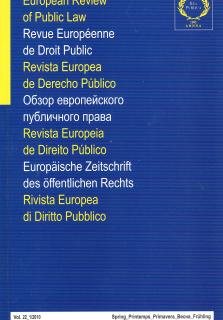
La mondialisation
et les mutations du droit constitutionnel
(Globalisation and Changes in Constitutional Law)
Université Jagellonne, Cracovie, Pologne
The “classic” constitutional law is the result of a slow evolution in three stages: birth of the modern State - birth of the constitutional State - birth of the democratic constitutional State. The globalisation calls into question the three elements of the construction of the classic constitutionalism: it reduces the position of the State, transforms the significance and position of the Constitution and increases the democracy deficit. The changes resulting from globalisation lead to the creation of a polycentric global political system in which the State is not anymore the only holder of political power. The power is divided between the State, which however keeps an essential part of it, and other actors that monopolise some attributes of the public authority in limited fields. Through globalisation, the Constitution is transformed without formal revisions. It loses its political exhaustiveness, governing only one part of the political phenomena. Through the development of the normative production outside the State, the Constitution loses its supreme normative force. The globalisation challenges the ability of isolated States to follow efficient national policies. This inability of the State to act efficiently is the main cause of the democracy deficit.
Le droit constitutionnel “classique” est le fruit d’une lente évolution en trois temps: naissance de l’Etat moderne - naissance de l’Etat constitutionnel - naissance de l’Etat constitutionnel démocratique. La mondialisation remet en cause les trois éléments de la construction du constitutionnalisme classique: elle réduit la place de l’Etat, transforme la signification et la place de la Constitution et aggrave le déficit de démocratie. Les mutations résultant de la mondialisation aboutissent à la création d’un système politique global polycentrique dans lequel l’Etat n’est plus le seul détenteur du pouvoir politique. La puissance se répartit entre l’Etat qui en garde tout de même une part essentielle et d’autres acteurs qui s’accaparent certains attributs de la puissance publique dans des domaines restreints. Avec la mondialisation, la Constitution se transforme sans révisions formelles. Elle perd son exhaustivité politique, ne régissant qu’une partie des phénomènes politiques. Avec le développement de la production normative en dehors de l’Etat, la Constitution perd sa force normative suprême. La mondialisation remet en cause la capacité d’Etats isolés de mener des politiques nationales efficaces. Cette incapacité de l’Etat à agir efficacement est la principale cause du déficit de démocratie.





















